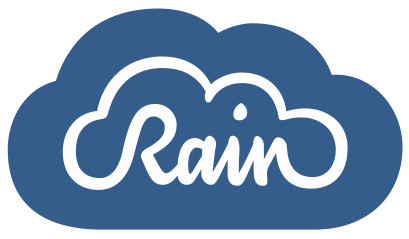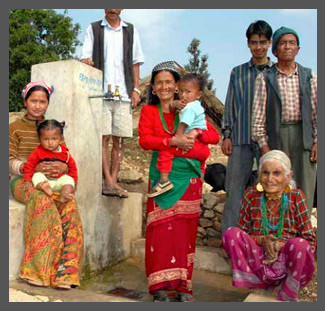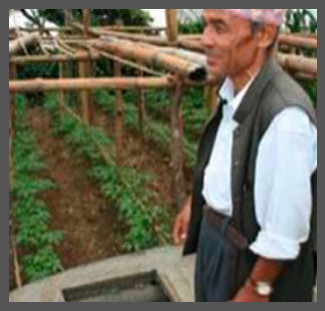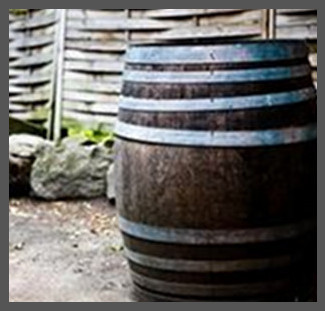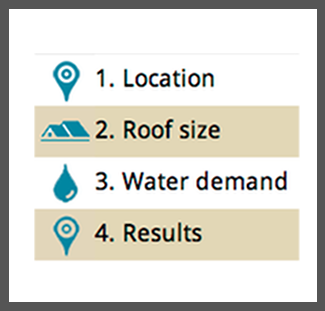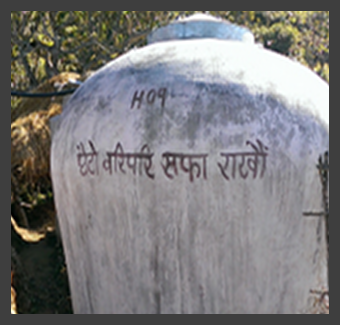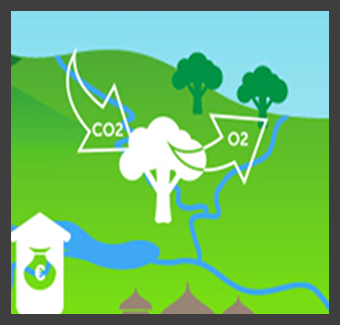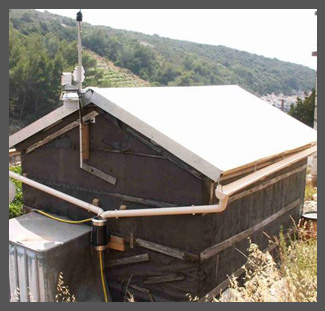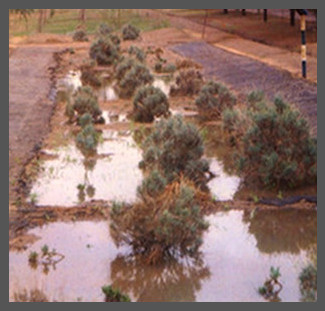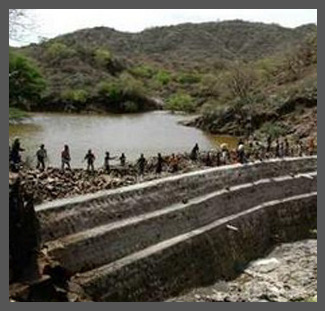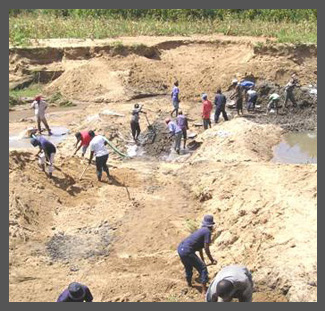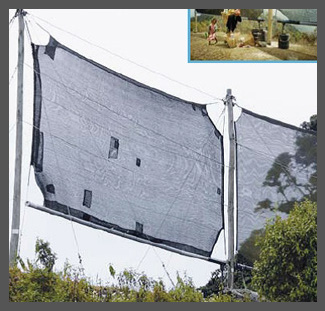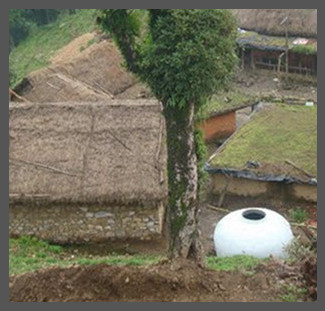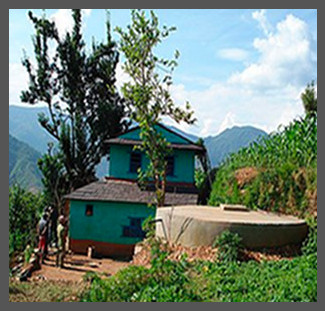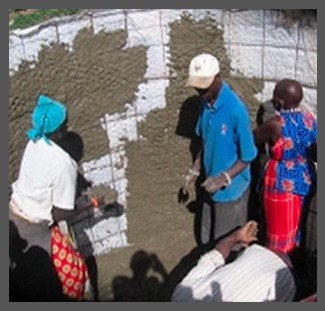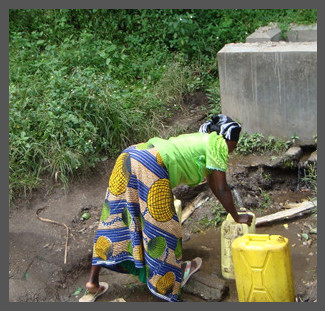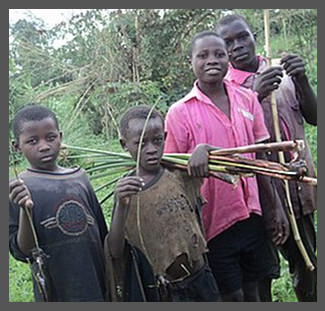Water Portal / Rainwater Harvesting
| |
|
|
|
|
|
|
|
|
|
|
Rainwater harvesting is a technique of collection and storage of rainwater into natural reservoirs or tanks, or the infiltration of surface water into subsurface aquifers (before it is lost as surface runoff). One method of rainwater harvesting is rooftop harvesting. With rooftop harvesting, most any surface — tiles, metal sheets, plastics, but not grass or palm leaf — can be used to intercept the flow of rainwater and provide a household with high-quality drinking water and year-round storage. Other uses include water for gardens, livestock, and irrigation, etc.
The reasons for using rainwater harvesting systems answer three questions:
What: Rainwater harvesting will improve water supply, food production, and ultimately food security.
Who: Water insecure households or individuals in rural areas will benefit the most from rainwater harvesting systems.
How: Since rainwater harvesting leads to water supply which leads to food security, this will greatly contribute to income generation.
Nepal |
Nepal |
3R and MUS |
Clearwater Revival |
Uganda Hills | |
Contents
Example rainwater harvesting in India
Tamil Nadu is the first Indian state to make rainwater harvesting mandatory. On 30 May 2014, the state government announced that it will set up 50,000 rainwater harvesting structures at various parts of the capital city of Chennai. [1]
Around 4,000 temples in Tamilnadu state traditionally had water tanks that were used for various rituals. The tanks also served as natural aquifers and helped recharge groundwater. Over the years, however, many of these tanks have gone out of use. Overflowing mounds of silt and garbage have replaced the water in them.
Now, following sustained campaigns by voluntary organisations and departments in charge of water distribution and use, authorities in Chennai have decided to restore around 40 major temple tanks in the city. The aim is to convert the tanks into catchments for rainwater harvesting. [2]
Rainwater harvesting links
Regional experiences
- Sustainability of Rainwater Harvesting System for the Domestic Needs (A Case Study of Daugha VDC, Gulmi, Nepal). Ramesh Chandra Bohara. 2017. It looks at issues like long-term functionality and impact of the intervention, summarizing the findings in four key sustainability dimenstions: technical, socio-environmental, institutional, and economic. The study concludes that RWH enjoys high technical and socio-environmental acceptance, but that the institutional and cost-recovery dimensions are weaker, leading to an overall estimate of "sustainable but at risk" for the VDC at hand.
- Traditional rainwater harvesting systems to the rescue! Rainwater harvesting systems are a success in India.
- Chennai - A Success Story: Rainwater Harvesting
- Pluvia: ENERGY # “PLUVIA” :: RAIN USED TO ILLUMINATE LOW INCOME HOMES (MEXICO, 2014)
Technologies & methods
- COMPONENTS OF A RAINWATER HARVESTING SYSTEM
- Smart 3R Solutions
- Tree-based sustainable farming in rainfed areas - webinar
- Rain Water Harvesting Innovation for Making Potable Water Available in Saline Groundwater Areas
Products
- Water Towers: Check Out These Amazing Towers In Ethiopia That Harvest Clean Water From Thin Air
- Groasis waterboxx: Using 1 liter of water instead of 10!
- bob® bag: bob® gives customers access to clean water.
- Rainwater pillow: The Original Rainwater Pillow is an innovative rainwater & storm water harvesting system designed to be stored in horizontal wasted space.
- Rainsoucer: Made in the U.S.A., the patent pending RainSaucer™ is a rain barrel accessory that allows you to harvest rainwater
Organizations & groups
- Rainwater harvesting sources. A list of 45 NGOs, government organizations, and some private companies that focus on rainwater harvesting programs, policies, and supplies.
- Rainwater for Food Security: We set an enabling environment for rainwater harvesting (RWH), in order to significantly increase food security. With help of our community on Rainwater Harvesting, we support the development of a more unified global network of national and regional organisations, networks and professionals, working in or interested in rainwater harvesting. By bringing together these key-actors and sharing knowledge in multiple ways, the Rainwater for Food Security programme aims to achieve sustainable change in rainwater harvesting programmes.
- Rainwater Harvesting Community on Dgroups.
Community Exchange - Rainwater Harvesting
The image below is the entry to conversations about rainwater harvesting (RWH) including best practices, troubleshooting, and advice about tanks and systems. We sourced these from the Rainwater Harvesting Community - a sub community within the Rural Water Supply Network community on Dgroups - which is a free member-only forum, where people can ask a pool of over 700 members from 86 countries about rainwater harvesting. You can become a member on their site for greater involvement, if you have questions you need to know for your RWH project. Click on the image to get started! Or click here.
Field experiences
These projects are utilizing rainwater harvesting techniques and are part of the project listing in Really Simple Reporting (RSR) on Akvo.org. Click the image to get started!
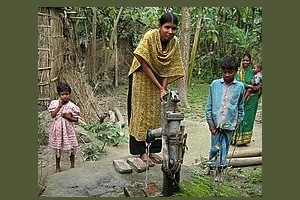 WASH program in Rural Bangladesh |
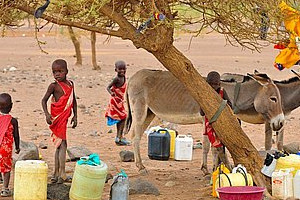 Scale up of Sustainable Water Access |
RSR Project |
RSR Project |
RSR Project | ||
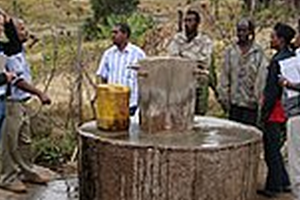 Rainwater Harvesting Capacity Center |
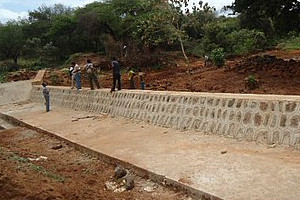 Support on WASH - in Miyo woreda |
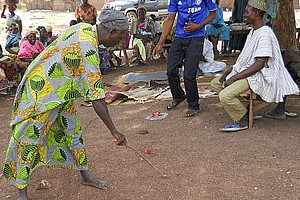 Upscaling CLTS for Healthy Communities |
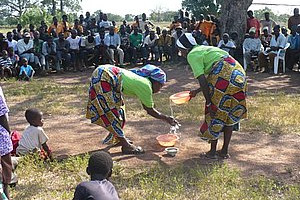 Partnership in WASH services delivery |
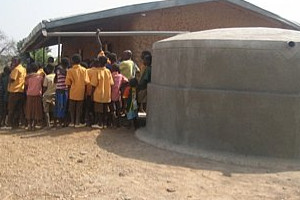 Northern Region WASH Programme | ||
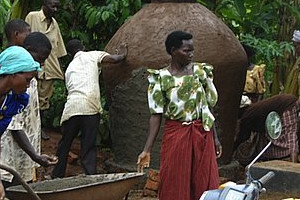 Raising awareness on rainwater harvesting |
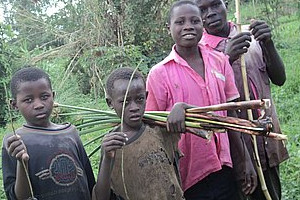 Wetland Management & Water Harvesting |
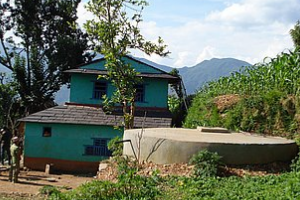 Rain Water Harvesting in Nepal |
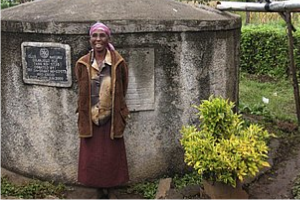 Rainwater Harvesting in Kenya |
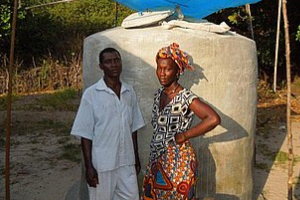 Rainwater harvesting in Guinee Bissau 2 | ||
Acknowledgements
Many of the tools, technologies, and projects on this page are courtesy of the Rainwater Harvesting Implementation Network.
RAIN is an international network with the aim to increase access to water for vulnerable sections of society in developing countries - women and children in particular - by collecting and storing rainwater.
Started in December 2003, RAIN focuses on field implementation of small-scale rainwater harvesting projects, capacity building of local organisations and knowledge exchange on rainwater harvesting on a global scale.
- This rainwater harvesting page can also also be found on the Rainwater harvesting page in Wikiversity.
